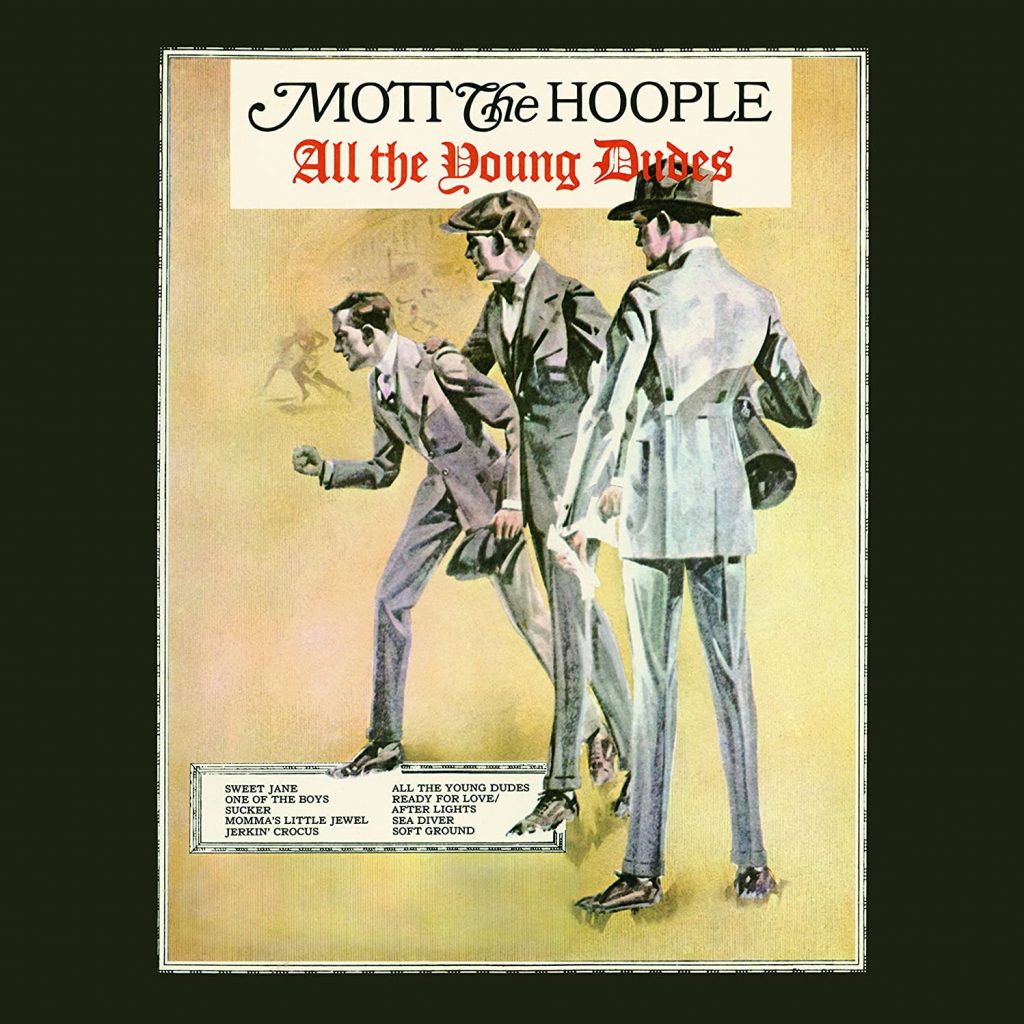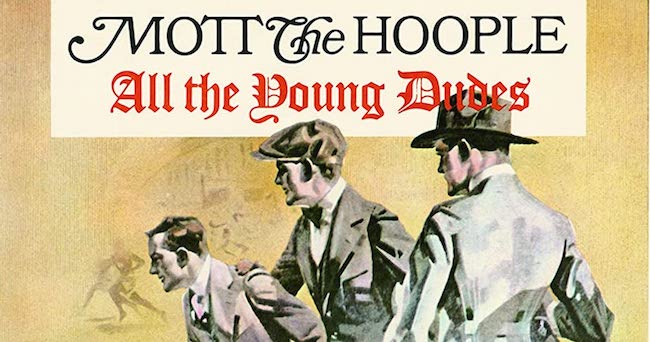 The tale of Mott the Hoople’s near demise and their rescue from retirement by super fan David Bowie is well etched in the annals of rock and roll legend. Despite several previous albums of note on Island Records (Mott the Hoople, Mad Shadows, Wildlife, Brain Capers), Mott had yet to gather any momentum and was on the verge of disbanding due to frustration over that failure.
The tale of Mott the Hoople’s near demise and their rescue from retirement by super fan David Bowie is well etched in the annals of rock and roll legend. Despite several previous albums of note on Island Records (Mott the Hoople, Mad Shadows, Wildlife, Brain Capers), Mott had yet to gather any momentum and was on the verge of disbanding due to frustration over that failure.
That’s when Bowie swooped in and provided them with the overarching anthem that would soon become their signature song.
Released on September 8, 1972, the album All the Young Dudes from Mott the Hoople effectively capitalized on the success of the title track, but happily too, the set as a whole was equally assertive. It not only emphasized Mott the Hoople’s bravado, but helped lay the foundation for the so-called ’70s glam movement as well, underscored by the band’s penchant for flashy stagewear and an affected yet confident attitude.
Naturally then, “All the Young Dudes” set the tone, and in fact, it resonates even now. Its lyric expresses the need for tolerance, especially as it applies to gender diversity and the embrace of everyone, no matter their sexual preference:
“Now Jimmy looking sweet though he dresses like a queen
He can kick like a mule
It’s a real mean team
We can love
Oh we can love.”
Other songs affirmed that premise as well. “Ready for Love,” written by guitarist Mick Ralphs, evolved as one of the most driven and decisive songs of the album overall, and was so potent, in fact, that it was reclaimed by Ralphs’ subsequent outfit, Bad Company. Given its ready riff and determined delivery, it’s not only tenacious in tone, but sturdy in its simplicity.
A secondary cover, a resilient version of Lou Reed’s classic “Sweet Jane”—a song that originally appeared on the Velvet Underground’s Loaded album—helped give that number its own significant status, which it retains even now. In Mott’s capable hands, it became an established standard, setting off a spate of other covers in the years to come.
Nevertheless, the song that ably sums up the band’s attitude and agility—while also making for an obvious companion piece to the title track—is the song that ended up as the B-side when “Dudes” was originally released as a single. “One of the Boys,” written by Ralphs and singer, guitarist, piano player and de facto leader Ian Hunter, became a shared and stirring statement about the newfound unity that glam would eventually embrace. It’s a relentless rocker to boot.
The album’s quality cuts weren’t limited to those songs, however. Hunter’s seductive “Sea Diver,” his sturdy cowrite with bassist Pete Watts, “Momma’s Little Jewel,” and the alluring “Soft Ground,” written and sung by organist Verden Allen, helped fill out the setlist, making it clear that Mott had the material needed to maintain both consistency and credibility. The fact that Bowie took his commitment to the band a significant step further by opting to sit behind the boards, all but assured the album would achieve a certain level of success.
All the Young Dudes effectively broke Mott the Hoople in the States, peaking at #89, their first album to crack the Billboard top 100. The title track, meanwhile, reached #37 on the singles chart in the U.S., by far their strongest showing (albeit way below its #3 placement in the U.K.). The song has remained a staple on classic rock radio ever since.
The band would rise to even greater heights with their next album, the simply titled Mott. In retrospect, it would prove to be the high point of their career. Nevertheless, it was All the Young Dudes that rescued the group from oblivion and established them as real rebels to be reckoned with.
Watch Ian Hunter perform “All the Young Dudes” live with Def Leppard and Brian May of Queen at the 2016 Rock and Roll Hall of Fame induction ceremony
Related: Joe Elliott of Def Leppard’s “love letter” to Mott the Hoople


2 Comments
Mott The Hoople, Slade, T-Rex, The Sweet, Roxy Music – Never fully realized or fully appreciated in the States in their prime (early 70s), but legends in the rest of the world.
Excellent article of Mott’s breakthrough album.
Regaled it in 1972, and still play it once or twice a year.
The albums that followed, “Mott” and “The Hoople” also was a great time for hard-driving, tongue-in-cheek rock and roll.
I saw them in Memphis. The opening act was a little band called Queen.